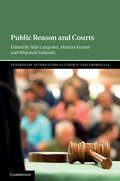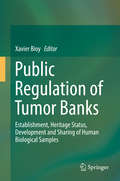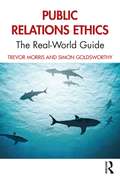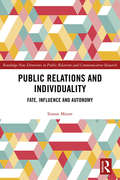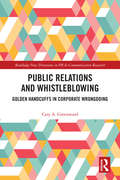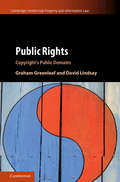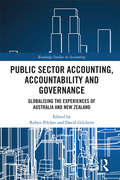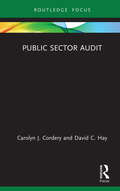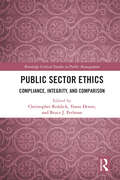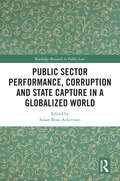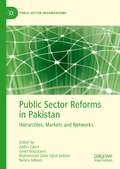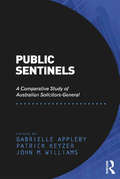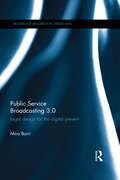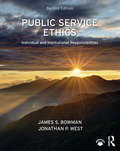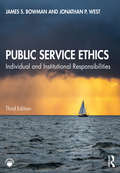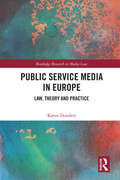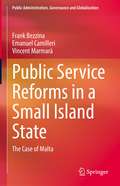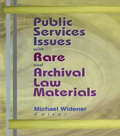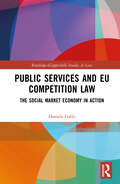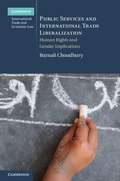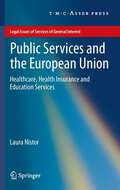- Table View
- List View
Public Reason and Courts (Studies on International Courts and Tribunals)
by Wojciech Sadurski Mattias Kumm Silje A. LangvatnPublic Reason and Courts is an interdisciplinary study of public reason and courts with contributions from leading scholars in legal theory, political philosophy and political science. The book's chapters demonstrate the breadth of ways in which public reason and public justification is currently seen as relevant for adjudicative reasoning and review practices, and includes critical assessments of different ways that the idea of public reason has been applied to courts. It shows that public reason is not just an abstract theoretical concept used by political philosophers, but an idea that spurs new perspectives and normative frameworks also for legal scholars and judges. In particular, the book demonstrates the potential, and the limitations, of the idea of public reason as a source of legitimacy for courts, in a context where many courts face political backlashes and crisis of trust.
Public Regulation of Tumor Banks: Establishment, Heritage Status, Development and Sharing of Human Biological Samples
by Xavier BioyThe multidisciplinary book assesses the legal and economic uncertainties surrounding the collection, storage, provision and economic development of biological samples (tumors, tissues, cells) and associated personal data related to oncology. Public, partly public and private sector actors in the field of cancer care and research hold collections supported by significant public and social funding. Under certain conditions, particularly in the context of networking (sometimes promoted by public authorities), these collections can also represent major economic assets and scientific resources. However, this involves a number of issues and institutional constraints: legal: the will of the source person; non-pecuniary damage; freedom to establish collections; competence in deciding on their use; legal frameworks for their distribution; desire for return on investment for public institutions, notably in terms of industrial and intellectual property.economic: cost of establishing and running biological resource centres; destroying resources; emerging markets; profit sharing.public health policy choices: prioritisation of therapeutic measures over research (fundamental or clinical trials); conservation of resources; promotion of scientific (and not commercial) value of collections. The establishment, heritage recognition (“patrimonialisation”), development and sharing of these resources thus merit our calling into question present practices and their evolution, as well as the leverage available to public authorities (incentives, legislation, regulation) in a context where norms emerge from professional practice to become widely used in collaborative networks. Filling a gap in the current literature on law and economics, which pays little heed to these specific considerations, this book explores these considerations to bring to light the economic implications of ethical choices and governance issues in the health sector (structural organisation of local, national and European actors in oncology). It is intended for researchers in fields such as law, economics and biomedical sciences, as well as for public policymakers.
Public Relations Ethics: The Real-World Guide
by Trevor Morris Simon GoldsworthyThis book is a pragmatic, case-rich guide to how current and future public relations practitioners can apply ethical principles and the industry’s codes of ethics to their day-to-day work. Authors Trevor Morris and Simon Goldsworthy draw on their years of industry and academic experience to illustrate key ethical issues and ground them in reality, all within an international frame of reference. Public Relations Ethics incorporates interviews with industry practitioners, offering contrasting perspectives as well as recent examples of real-life complaints and disciplinary issues. Provocative questions and exercises help readers grapple with ethical dilemmas and review the key scenarios and challenges that PR people face. The book is ideal at the undergraduate, postgraduate and continuing education levels as a core text for public relations ethics courses and a supplementary text for general public relations survey courses. Accompanying the text are online resources for both students and instructors, including lecture slides and links to further resources.
Public Relations and Individuality: Fate, Influence and Autonomy (Routledge New Directions In Public Relations And Communication Research Ser.)
by Simon MooreOur individuality is partly shaped by encounters with the external world so it is inconceivable that we are unaffected by the planned management of public communications which manages much of our external experience. Exploring one of the most important mediators between organizations and individual encounters – public relations (PR) – is long overdue. By developing new ways to create and connect with us as members of particular target audiences, has it changed our interior existence by altering perceptions of the world outside ourselves? PR’s massive impact on groups, society or organizations is rightly explored, but its immense influence on our individuality is neglected. In an age where new media makes deepening connections to individuals, the relationship of PR to individuality is one of the field’s most profoundly important issues. This provocative book will assist scholars and advanced students in PR and communication research to develop a clear, structured, disciplined understanding of this phenomenon and its implications.
Public Relations and Whistleblowing: Golden Handcuffs in Corporate Wrongdoing (Routledge New Directions in PR & Communication Research)
by Cary A. GreenwoodThere is a growing interest in corporate whistleblowing, but no comprehensive research has yet focused on public relations practice. Drawing on extensive research on Fortune 1000 and Wilshire 5000 corporations, this book reveals executives’ attitudes and relationships toward their organizations and their impact on whistleblowing. Perhaps unsurprisingly, it reveals that wrongdoing in corporations and the privileges of power coexist. Top-ranking public relations executives, who are mostly white and male, are more likely to be aware of wrongdoing but no more likely to blow the whistle, fundamentally due to their positive relationship with their employers. Using the new lens of evolutionary theory, this study explains whistleblowing, retaliation, and relationships, and in the light of the connection between whistleblowing behavior and executives’ attitudes, it proposes a new theory of the phenomenon of Golden Handcuffs. As public attitudes to corporations, corporate social responsibility (CSR), and transparency harden, these findings have serious implications for companies globally. Researchers, scholars, and advanced students in public relations, organizational communication, corporate communication, strategic communication, corporate reputation, and CSR will find this book full of revealing insights.
Public Rights: Copyright's Public Domains (Cambridge Intellectual Property and Information Law #45)
by David Lindsay Graham GreenleafAccess to works in the public domain is an important source of human creativity and autonomy, whether in the arts, scientific research or online discourse. But what can users actually do with works without obtaining the permission of a copyright owner? Readers will be surprised to find how many different kinds of permitted usage exist around the world. This book offers a comprehensive international and comparative account of the copyright public domain. It identifies fifteen categories of public rights and gives a detailed legal explanation of each, showing how their implementation differs between jurisdictions. Through this analysis, the authors aim to restore balance to copyright policy debates, and to contribute to such debates by making practical law reform proposals. A major intervention in the field of intellectual property law and copyright, this book will appeal to lawyers, scholars and those involved in the administration of copyright law.
Public Sector Accounting, Accountability and Governance: Globalising the Experiences of Australia and New Zealand (Routledge Studies in Accounting)
by Robyn Pilcher David GilchristFunded by taxation, public spending cannot be separated from politics and ensuring efficiency and effectiveness is always high on the political and policy agenda. Accounting, accountability, governance and auditing are essential ingredients in evaluating public sector performance. Australia and New Zealand are world leaders when it comes to public sector accounting—such as being the first to introduce transaction-neutral accounting standards. This edited collection considers current issues impacting the public sector by primarily drawing upon experiences of Australia and New Zealand. Then, by combining history (from the time of the Domesday book, early sovereignty and Shakespeare) with current practice (differential reporting, international financial reporting standards, government performance, voter turnout, joined-up government and auditing practices), we use these experiences to illuminate the global issues of public sector accounting, accountability and governance. Based on rigorous research by top public sector researchers, this edited collection offers a multitude of future research ideas to enable those interested in following this pathway—whether they are in Australia, New Zealand, the United Kingdom, Europe, the United States of America, Africa or anywhere else in the world—an avenue to traverse.
Public Sector Audit (Routledge Focus on Accounting and Auditing)
by Carolyn J. Cordery David C. HayThis book provides a concise overview of the current context and types of public sector audit and the varied structures within which public sector audit is practised across the world. It summarises the objectives of public sector audit as well as explores the role of the International Organisation of Supreme Audit Institutions in providing guidance to these. Drawing on public and private sector audit as well as the views of academics and practitioners on public sector audit, it provides a unique research-based guide to the current issues and future challenges in the field.
Public Sector Criminological Research: The Australian Institute of Criminology, 1972–2022
by Russell G. SmithThis book explores the role and development of criminological research in the public sector during the last half-century. It identifies the benefits such research has provided and assesses whether the community has received value for the funds expended. The Australian Institute of Criminology is used as a case study to illustrate the challenges and pressures facing those who have sought to carry out independent crime and justice research in the public sector, to assess what fifty years of work has achieved and to determine whether or not there remains a need for criminologists to be employed by governments. The book is based on extensive archival research, administrative data analysis, interviews with current and previous staff and the perspectives of scholars in comparable institutions globally. It presents new historical information as well as current and future critical perspectives on crime and justice research in a unique Australian government organization.
Public Sector Ethics: Compliance, Integrity, and Comparison (Routledge Critical Studies in Public Management)
by Christopher Reddick Tansu Demir Bruce J. PerlmanPublic Sector Ethics: Compliance, Integrity, and Comparison presents a comprehensive treatment of the subject of ethics in the public sector. What structural elements are necessary and how to create organizations that make ethics their priority are the questions that this edited book addresses. It focuses on ethics management in public organizations and includes national case studies from select low- to middle-income countries.Taken together, the chapters in this book cover the mechanisms, activities, and approaches that public organizations employ in ethics management. These are of utmost importance because the actions of public organizations affect citizens’ lives, liberties, and property, and their ethical character affects citizens’ faith in government. Numerous factors are at play in each instance of ethics management in public organizations, and controlling ethical behavior is difficult. This book suggests that effective ethics management requires a comprehensive approach. Traditional approaches such as ethics codes, policies and legislation, training, incentives, sanctions, monitoring, and compliance reviews are tools to achieve ethical conformity. Yet, they are effective only if leadership, values, and cultural transformation support them. This edited volume is a cohesive treatment of the subject, covering traditional approaches to ethics management, such as monitoring and compliance, and more contemporary approaches, like integrity building through ethical leadership and organizational values, as well as how to skillfully and effectively combine them to change organizational ethical contexts.This book exposes readers to new approaches and emerging issues in public sector ethics, aids in understanding the challenges of creating ethical organizations, and helps to develop a deeper understanding of ethics management in government organizations. It will be of interest to researchers, academics, and advanced students in the fields of business ethics, public administration and management, leadership, and organizational studies.
Public Sector Performance, Corruption and State Capture in a Globalized World (Routledge Research in Public Law)
by Susan Rose-AckermanThis collection examines the difficult task of reforming governments worldwide to meet citizens’ needs and aspirations. It advances constructive efforts to enhance public accountability while recognizing the complex ways in which corruption, greed, and state capture undermine the legitimacy and performance of government. The contributors are political scientists, lawyers, and economists who bring a cross-disciplinary approach to their chosen subjects. The first group of chapters deals with public sector performance, development, and public participation. Complementary pieces by a practitioner and a scholar confront the challenges of achieving reform in countries with difficult political environments and extensive poverty and inequality. The second group emphasizes the way corruption and state capture limit the accountability and effectiveness of governments in both developing and wealthy countries. The contributions consider the institutional roots of dysfunctional government and their links to the private sector. Taken together, the volume surveys a wide range of topics with theoretical arguments and empirical findings that provide insights into real-world problems and policymaking dilemmas. Inspired by Susan Rose-Ackerman’s fifty-year exploration of public policymaking, public law, and corruption, the collection will be an invaluable resource for researchers, academics and policy makers working in the areas of Public Law, Anticorruption, and Political-Economy.
Public Sector Reforms in Pakistan: Hierarchies, Markets and Networks (Public Sector Organizations)
by Geert Bouckaert Abiha Zahra Muhammad Zafar Iqbal Jadoon Nasira JabeenThis book provides a research-based analysis of public sector reforms in Pakistan. It offers a broad overview of reforms at different levels of government – including federal, provincial and local – and examines decentralization and devolution reforms in various policy sectors. It also reflects on market-oriented reforms and the steps taken to involve the private sector to build a better-governed public sector, and explores new trends in the public sector in the areas of digitalisation and disaster management. Bringing together young researchers, academics, and practitioners, the book sets a new milestone in the movement towards context-specific reform studies in both academia and the professional practice of public administration, particularly in South Asia.
Public Security in Federal Polities
by Christian Leuprecht Mario Kölling Todd HataleyPublic Security in Federal Polities is the first systematic and methodical study to bring together the fields of security studies and comparative federalism. The volume explores the symbiotic relationship between public security concerns and institutional design, public administration, and public policy across nine federal country case studies: Brazil, Canada, Germany, India, Mexico, South Africa, Spain, Switzerland, and the United States. In addressing specific national security concerns and aspects of globalization that are challenging conventional approaches to global, international, regional, and domestic security, this volume examines how the constitutional and institutional framework of a society affects the effectiveness and efficiency of public security arrangements. Public Security in Federal Polities identifies differences and similarities, highlights best practices, and draws out lessons for both particular federations, and for federal systems in general. This book is essential reading for scholars, students, practitioners as well as policy- and decision-makers of security and federalism.
Public Security in the Negotiated State: Policing in Latin America and Beyond (Governance and Limited Statehood)
by Markus-Michael MüllerPolicing and security governance in areas of limited statehood have become central issues in contemporary academic and political debates. This book offers an in-depth study on public security provision, the resulting state-society relations, and policing in Mexico City.
Public Sentinels: A Comparative Study of Australian Solicitors-General
by Patrick KeyzerIn recent years, controversy has surrounded the role of top government lawyers in the United States and the United Kingdom. Allegations of bad lawyering and bad ethics in public office over the ’torture memos’ in the United States and the political pressure placed on the Attorney-General in the United Kingdom to approve the legality of the Iraq war, have seen these relatively obscure group of government lawyers thrust into the public debate. Unlike its Anglo-American contemporaries, Australia’s chief legal adviser, the Solicitor-General, has remained largely out of the public eye. This collection provides a rare and overdue insight into a fundamental public institution in all Australian jurisdictions. It provides a historical, theoretical, practical and comparative perspective of this little known, but vitally important, office at a time when the transparency and accountability of government has taken on an increased significance. Of interest to anyone interested in the integrity of government, the book will be particularly useful to government, political parties and the academy. It will also be a valuable reference work to those working towards a redefinition of the role of top government legal advisors.
Public Service Broadcasting 3.0: Legal Design for the Digital Present (Routledge Research in Media Law #8)
by Mira BurriThe digital media environment is characterized by an abundance and diversity of content, a multiplicity of platforms, new modes of content production, distribution and access, and changed patterns of consumer and business behaviour. This has challenged the traditional model of public service broadcasting (PSB) in diverse ways. This book explores whether and how PSB should adapt to reflect the conditions of the digital media space so that it can effectively and efficiently continue to serve its public mandate. Drawing on literature on media governance in media and communication science, public international law as well as discussions on cyberlaw, Mira Burri maps and critically analyses existing policy and scholarly debates on PSB transformation. She challenges some of conventional rationales for reform, identifies new ones, as well as exposes the limitations placed upon existing and future policy solutions by global media governance arrangements, especially in the fields of trade, copyright and Internet governance. The book goes on to advance a future-oriented model of Public Service Media, which is capable of matching an environment of technological and of governance complexity. As a work that explores how public interest objectives can be pursued efficiently and sustainably in the digital media ecology, this book will be of great interest and use to students and researchers in media law, information technology law, and broadcast media studies, as well as to policy-makers.
Public Service Ethics: Individual and Institutional Responsibilities
by James S. Bowman Jonathan P. WestEthics—in all its exemplary and exhausting forms—matters. It deals with the most gripping question in public life: "What is the right thing to do?" Now in a thoroughly revised second edition, Public Service Ethics: Individual and Institutional Responsibilities introduces readers to this personally relevant and professionally challenging field of study. No matter the topic—the necessity of ethics, intriguing human behavior experiments, the role of ethics codes, whistleblowing incidents, corruption exposés, and the grandeur and decay of morality—there is no shortage of controversy. The book enables readers to: appreciate why ethics is essential to leadership; understand and apply moral development theory at the individual and organizational levels of analysis; differentiate between ethical problems and ethical dilemmas, and design creative ways to deal with them; develop abilities to use moral imagination and ethical reasoning—to appraise, argue, and defend an ethical position, and cultivate individual and institutional initiatives to improve ethical climate and infrastructure. Authors James Bowman and Jonathan West capture reader interest by featuring learning objectives, skill-building material, discussion questions, and exercises in each chapter.? The authors’ narrative is user-friendly and accessible, highlighting dilemmas and challenging readers to "own" the book by annotating the pages with one’s own ideas and insights, then interacting with others in a live or virtual classroom to stretch one’s thinking about the management of ethics and ethics of management. The ultimate goal is to bolster students’ confidence and prepare them for the ethical problems they will face in the future, equipping them with the conceptual frameworks and context to approach thorny questions and behave ethically.
Public Service Ethics: Individual and Institutional Responsibilities
by James S. Bowman Jonathan P. WestThe study and practice of ethics, in all its exemplary and execrable forms, matter now more than ever. It deals with one of the most gripping questions in life: "What is the right thing to do?" Public Service Ethics: Individual and Institutional Responsibilities, Third Edition, introduces readers to this personally relevant and professionally challenging field of study. No matter the topic—the necessity of ethics, intriguing human behavior experiments, provocative approaches to decision-making, new theories to understand ethical actions, the role of ethics codes, whistleblowing incidents, corruption exposés, and the grandeur as well as decay of morality—there is no shortage of controversy. This book discusses these issues, explains how they arise, and suggests what can be done about them. The authors make the narrative user-friendly and accessible by highlighting dilemmas, challenging readers to resolve them, and enticing them to go beyond the text to discover and confront new issues. New to this Third Edition: Exploration of fascinating and important new topics such as the Green New Deal, Black Lives Matter, oaths of office, classroom dishonesty, state corruption, the Biden administration, and the ethical challenges of the COVID-19 pandemic and response. In-depth profiles of newsworthy figures, including Michael Flynn, Alexander Vindman, Anthony Fauci, and John Lewis. All new case studies drawing on actual and hypothetical events to give students an opportunity to apply concepts and analytical frameworks. All new end-of-chapter discussion questions and exercises to encourage students to think more deeply about ethical issues. The authors' conversational writing style invites readers to annotate pages with their own ideas, experiences, comparisons, and insights, bolstering students' confidence and ultimately preparing them for the ethical problems they will face in their own careers. This lively and thorough new edition is required reading for all public administration and public policy students.
Public Service Media in Europe: Law, Theory and Practice (Routledge Research in Media Law)
by Karen DondersContributing to a rethink of Public Service Media, this book combines theoretical insights and legal frameworks with practice, examining theory and policy development in a bottom-up manner. It explores the practices of Public Service Media across Europe, assessing the rules that govern Public Service Media at both the EU and the National Member State level, identifying common trends, initiated by both the European Commission and individual countries, illustrating the context-dependent development of Public Service Media and challenging the theories of Public Service Broadcasting which have developed an ideal-type public broadcaster based on the well-funded BBC in an atypical media market. Seeking to further explore the actual practices of Public Service Media and make recommendations for the development of more sustainable policies, this book offers case studies of rules and practices from across a variety of EU Member States to consider the extent to which public broadcasters are making the transition to public media organisations, and how public broadcasters and governments are shaping Public Service Media together. This book is a must-read for all scholars who take an interest in Public Service Media, media policy and media systems literature at large. It will also be of interest to practitioners working in government, Public Service Media and commercial media.
Public Service Motivation in der Polizei: Eine Grounded Theory Studie zum Diskrepanzerleben nebenberuflich studierender Bediensteter im Polizeivollzugsdienst (Schriftenreihe zur Polizei- und Sicherheitsforschung)
by Annika DreimannPublic Service Motivation (PSM) beschreibt eine besondere Motivation von Mitarbeitenden im öffentlichen Dienst, auch ohne externe Anreize einen Beitrag zum Gemeinwohl leisten zu wollen. Doch was passiert mit Bediensteten im Polizeivollzugsdienst, wenn sie plötzlich ihre Energie auf ein nebenberufliches Studium lenken? Im vorliegenden Band wurde mittels Grounded Theory Methodik untersucht, ob sich die Motivation für ein nebenberufliches Studium auf die PSM von Bediensteten im Polizeivollzugsdienst auswirkt und welche Faktoren hierbei eine Rolle spielen. Anhand vieler Beispiele wird ein spezifisches Diskrepanzerleben von Mitarbeitenden im Polizeivollzugsdienst erläutert, um das Phänomen besser verstehen zu können. Ein duales Handlungsmodell unterstützt Polizeibehörden sowie Personalverantwortliche dabei, angemessen und zielgerichtet auf das neue Phänomen zu reagieren, um eine langfristige Mitarbeiterbindung sowie den Erhalt der Leistungsbereitschaft und Leistungsfähigkeit im Sinne einer ausgeprägten PSM sicherzustellen.
Public Service Reforms in a Small Island State: The Case of Malta (Public Administration, Governance and Globalization #22)
by Emanuel Camilleri Frank Bezzina Vincent MarmaràThis book provides a detailed examination of public service reforms in Malta. Focusing on both the trajectory and substance of the reforms, the volume provides a holistic treatment of the public sector in the European Union’s smallest member state. The book is divided into four parts. Part I covers the historical background of public service administration and management in Malta from the 1500s to the 2010s. Part II focuses on recent reforms, begun in 2013, after the election of Prime Minister Joseph Muscat. Each chapter in this part addresses a particular reform theme: transparency and accountability; civil service systems and HR management; service delivery and digitalisation; organisation and management of government reforms; policy making, coordination, and implementation. Part III investigates the internal and external impact of the reforms, reporting and analyzing the results of a survey carried out among government employees and the Maltese population. The book concludes with a chapter on global reform trends that are likely to impact public service delivery in the future. Providing an in-depth view of public service in a small island state, this volume will be useful to researchers and students interested in public sector management, administration, and public policy as well as practitioners, consultants, and government employees.
Public Services Issues with Rare and Archival Law Materials
by Michael Widener“Rare books and archives come alive when consulted by readers and researchers.” --from the IntroductionIn the administrative and budgetary environment of law librarianship, outstanding reference service is crucial to the survival and growth of special collections. Public Services Issues with Rare and Archival Law Materials offers practical suggestions for putting these valuable special collections to work. Each chapter gives clear, proven advice on making the most of rare book sections and archives to contribute to the mission of their libraries and parent institutions. Public Services Issues with Rare and Archival Law Materials provides a comprehensive overview of issues in using these special collections. It begins with an original study of the research habits of legal historians, which can help you plan a strategy for making your collection more accessible to scholars. It concludes with thoughtful consideration of the ethical issues of using archived papers, balancing the scholar&’s need to understand the inner workings of the legal system against the need for private court deliberations and attorney-client privilege. This wide-ranging book provides the tools you need for keeping archives in active service, including: detailed instructions for the care and use of rare legal materials ideas for creating exhibits and outreach activities, including Web sites suggestions for working with early books on Roman and canon law practical techniques for using archives in litigation and cooperating with attorneys a bibliography of law-related archives and rare-book librarianshipThis essential book will assist rare book librarians and archivists to provide better reference service by providing examples of best practice and solutions to common problems. Public Services Issues with Rare and Archival Law Materials is an indispensable resource for law librarians, archivists, and scholars.
Public Services and EU Competition Law: The Social Market Economy in Action (Routledge-Giappichelli Studies in Law)
by Daniele GalloThis monograph, which was also designed as a short reference book for specialized undergraduate and graduate courses on EU law, intends to shed light on, and legally frame, the evolution of the doctrine of services of general economic interest (SGEIs). The book emphasizes the pivotal role played by SGEIs in striking a fair balance between market and social objectives. To this end, the book claims, first of all, that SGEIs have a dual nature inasmuch as they act as a limitation to/derogation from the free market and, simultaneously, as a value and positive obligation addressed at national authorities, undertakings, and EU institutions. The EU notions of access to public services and universal service are the clearest signal of such phenomenon. Secondly, the book claims that the transfer of competences from the Union to the Member States and the reaffirmation of Member States’ sovereignty in crucial sectors of the economy are not the only solutions to foster social rights. In fact, this narrative is apt to undermine the foundations, spirit, and purpose of the process of European integration, especially at a time like the present, when new forms of populism and anti-Europeanism are on the rise, and when a European response is imperative to counter the spread of the coronavirus in European countries. The book concludes that SGEIs’ regulation is an area of law where the EU institutions have generally successfully put into action and consolidated the social market economy principles on which the EU was founded. This is even further proof that the EU is not merely the reflection of interests linked to market completion, but also and foremost a ‘Community based on the rule of law’. The book will be a valuable resource for academics and researchers in EU Law, European Public Law and EU competition law.
Public Services and International Trade Liberalization: Human Rights and Gender Implications
by Barnali ChoudhuryDoes public service liberalization pose a threat to gender and human rights? Traditionally considered essential services provided by a state to its citizens, public services are often viewed as public goods which embody social values. Subjecting them to market ideology thus raises concerns that the intrinsic social nature of these services will be negated. Moreover, as those most likely to be reliant on public services, public service liberalization may also further marginalize women. Nevertheless, states continue to increasingly liberalize public services. Barnali Choudhury explores the implications of public service liberalization. Using primarily a legal approach, but drawing from case studies, empirical research and gender theories, she examines whether liberalization under the General Agreement on Trade in Services and other liberalization vehicles such as preferential trade and investment agreements compromise human rights and gender objectives.
Public Services and the European Union
by Laura NistorPolitically sensitive and economically important, welfare services such as health care, health insurance and education have opened up a heated debate in the EU. The application of EU law to welfare services raises discontent from the part of the Member States who perceive their systems to be under threat. Resisting to the application of the EU law is sometimes seen as part of protecting those values. This book suggests that this resistance is largely unjustified. EU law is not damaging to welfare systems, but it provides adequate balancing mechanisms to ensure that all interests are protected. The approach taken in analysing the impact of EU law on welfare services is to look at the negative integration process and answer the questions related to the extent to which EU law applies to welfare services and the kinds of safeguards the Court offers for these services. The proportionality principle distinguishes itself as the central element in balancing national and Community interests. Being part of the broader integration process, negative harmonization creates legislative lacunae, and therefore, this book also looks at alternative solutions to the negative harmonization process, namely positive and soft law.
